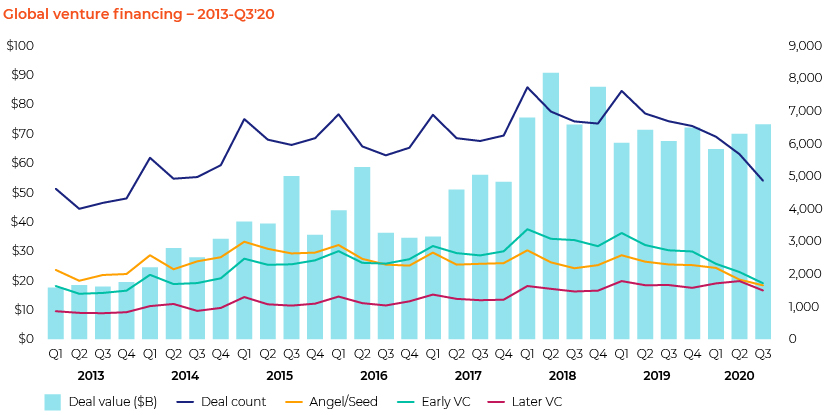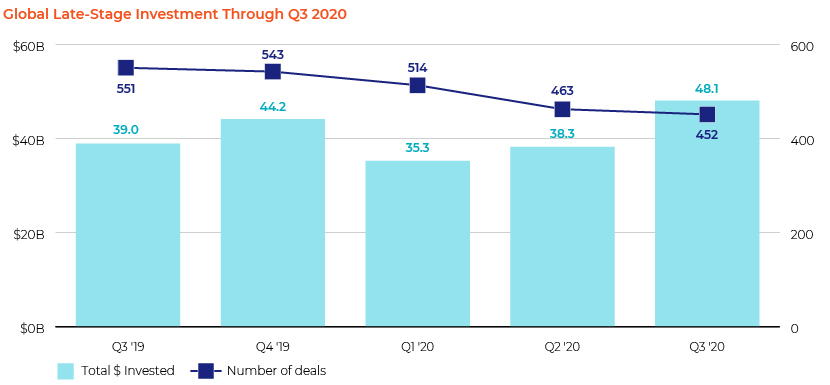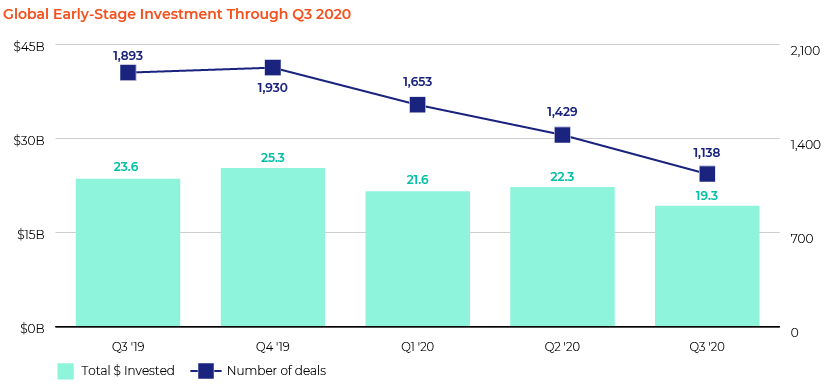Published on December 7, 2020 by Prashant Gupta
We are now almost 12 months into a global pandemic with no clear end in sight. When global lockdowns were suddenly imposed in March 2020, sentiment was that an economic downturn was inevitable. It was widely expected that venture capital (VC) funding would be severely impacted.
The number of VC deals globally has indeed declined for a sixth straight quarter, and we expect the pandemic to have resulted in further decline. However, we believe the contraction in deal volume so far this year is not sharp enough to advocate anything other than moderate caution. Conversely, VC investment reached USD73.2bn in 3Q20 (up c.31% y/y and c.16% q/q), showing significant resilience amid the headwinds from the pandemic.
Source: Venture Pulse, Q3'20. Global Analysis of Venture Funding, KPMG Private Enterprise. Data provided by PitchBook, 10/21/2020. Note: Refer to the Methodology section at the end of this report to understand any possible data discrepancies between this edition and previous editions of Venture Pulse.
Thanks to late-stage investments
This growth in VC funding, however, is driven by the continued focus of VC investors on late-stage companies. With 452 rounds so far, late-stage funding reached USD48.1bn in 3Q20, up c.23% y/y and c.26% q/q.
Source: https://news.crunchbase.com/news/q3-2020-global-venture-report/
Early-stage funding continues to lose traction
In contrast, early-stage funding has taken a disproportionate blow, showing a steep reduction in the number of initial financing deals for startups. The number of funding rounds decreased in most regions due to the COVID-19 pandemic, and the situation only worsened in the past two quarters. Early-stage companies are finding it extremely difficult to raise funds. The data shows that early-stage funding totalled only USD19.3bn globally in 3Q20, down c.18% y/y and c.13% q/q.
Source: https://news.crunchbase.com/news/q3-2020-global-venture-report/
The above statistics clearly show that private equity (PE) and VC firms are counting more on late-stage companies. If the decline in early-stage deals continues, these companies could run out of funds.
Early-stage funding is very important for startups. If they do not get access to funding, they will not be able to raise follow-on investment down the road. This would have an adverse impact on the startup ecosystem and likely result in consolidation, specifically in sectors severely impacted by the pandemic. It could also result in increased strategic and distressed investment activity.
Why is early-stage funding faltering?
Globally, there has been increasing participation in the VC investment space by less traditional investors, including family offices, Middle Eastern sovereign funds and newcomers looking for their first VC investment. Given that such investors have less experience in the VC market, many have opted for a more risk-averse approach to investing, focusing predominantly on late-stage companies.
Additionally, the advancement of the pandemic has changed the funding process. Many regions are facing a second wave of the pandemic. This is driving a significant change in investor behaviour, making investors more cautious and wanting to support stronger portfolio companies or protect their existing portfolios to help those companies weather the next few quarters rather than looking for new investments.
But the money is there
The real worry is who will fund early-stage companies or whether they will be funded at all.
The significant amount of dry powder in the VC market maintains the high level of competition for good deals. VC investors are expected to remain focused on companies able to help people and businesses align their needs with the new normal. Such companies, for example, tech-driven ones, are focused on facilitating remote working and home learning or on enhancing online service capabilities. Health, pharma and biotech startups will also likely remain key areas of investment. Fintech, business productivity solutions and digital platforms are also expected to be on the radar for VC investors.
Investors with the appropriate experience and skill set may be able to identify such companies, but it requires significant effort and resources. This puts pressure on the investment team, as it leaves limited room for deal execution.
Acuity Knowledge Partners can ease some of this pressure by sharing the workload. Our PE/VC experts provide cost-effective one-stop solutions to market players and help them stay abreast of the latest market trends, find good deals, conduct deeper diligence, carry out more meaningful valuation studies, set up effective monitoring processes and access strategic research experts to work closely with their portfolio companies.
Sources:
KPMG Venture Pulse: Global and regional trends in VC
Crunchbase
PitchBook-NVCA Venture Monitor: US VC ecosystem
Tags:
What's your view?
About the Author
Prashant is part of Private Equity & Consulting team and has been with the company for over 11 years. He has a total work experience of over 16 years and has rich exposure working on a variety of research and analysis assignments serving clients ranging from top asset managers, PE firms to bulge bracket investment banks.
He has extensive experience working on assignments covering in depth end to end credit analysis covering capital structure analysis, corporate structure analysis including guarantees and structural subordination case, covenant compliance analysis, financial modeling & valuation, asset recovery analysis,..Show More
Like the way we think?
Next time we post something new, we'll send it to your inbox












